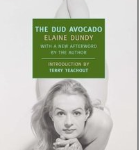 Sally Jay Gorce, a very young American woman just out of college, is the narrator and subject of Elaine Dundy’s hilarious 1958 novel “The Dud Avocado” (reissued in 2007 by NYRB Books). Sally Jay is an aspiring actress who wants to experience all that life – as it is lived in 1950s Paris – has to offer. And experience life she does: love affairs with diplomats, artists, and actors, being taken up by social sets and almost immediately dropped, a couple of stage roles, hopes for film roles. She also drinks rather a lot. Through it all Sally observes the comedy around her, relating it with a wry wit and the odd cross-language pun.
Sally Jay Gorce, a very young American woman just out of college, is the narrator and subject of Elaine Dundy’s hilarious 1958 novel “The Dud Avocado” (reissued in 2007 by NYRB Books). Sally Jay is an aspiring actress who wants to experience all that life – as it is lived in 1950s Paris – has to offer. And experience life she does: love affairs with diplomats, artists, and actors, being taken up by social sets and almost immediately dropped, a couple of stage roles, hopes for film roles. She also drinks rather a lot. Through it all Sally observes the comedy around her, relating it with a wry wit and the odd cross-language pun.
Sally Jay’s Uncle Roger has funded her for two years in Europe. “Uncle Roger had invented a special kind of screw which made him very, very rich, and a special kind of oracular noblesse oblige in distributing his largess, which made him very, very godlike.” At 13, Sally Jay ran away from school to become a bullfighter. After she was returned to her family, Uncle Roger summoned her to a meeting. Sally Jay told him then that she wanted her freedom – which at 13 meant “I want to stay out as late as I like and eat whatever I like any time I want to.” He promised to stake her to a couple of years once she finished school. Sally Jay’s self-knowledge hasn’t increased much in the intervening 10 years. As she puts it “I am totally incomprehensible to everyone including myself.”
So Sally Jay makes mistakes. She loses her passport. She drops one lover, takes up another, then leaves him to follow an American she regards as her true love to a villa near Biarritz. Entertaining complications ensure, all observed and reported by Sally Jay. She may not have much insight into herself, but she more than makes up for it by her understanding and portrayal of what is going on beneath the surface of the many social events she attends. She is invited to a dinner with her new beau, Larry Keevil. Even though the host, an Italian diplomat, is one of Sally’s discarded lovers she’s under the impression the dinner is an effort to remain friends, or at least an illustration of European sophistication. She’s quickly disabused, first by the presence of her own uncouth cousin and his wife, and then by the extremely smooth performance of the Contessa, another guest, who persuades Larry to leave with her. Sally Jay says of her former beau:
It was his feeling for economy I admired most. Obviously a fan of Sartre’s Huis Clos, he had gone to no unnecessary expense or complication to achieve his effects, simply following the Master’s formula of collecting together a few carefully selected souls and watching them torture one another . . . or rather, I realized with a start, watching them torture me. Florentine revenge was apparently every bit as effective as Corsican.
There are many more richly comic scenes in this book: Sally Jay’s efforts to persuade the American Embassy to issue her a new passport. Working as an extra in a French movie. Late nights in bars and nightclubs. Sally’s slow awakening to the fact that she has, indeed, made several mistakes, and her careful extrication of herself from them. This is a delightful book, very funny, and, as Terry Teachout observes in his introduction, its lessons, if they are there at all, are only between the lines. Do you agree? Let us know in the comments.
Have a book you want me to know about? Email me at asbowie@gmail.com. I also blog about metrics at asbowie.blogspot.com.
